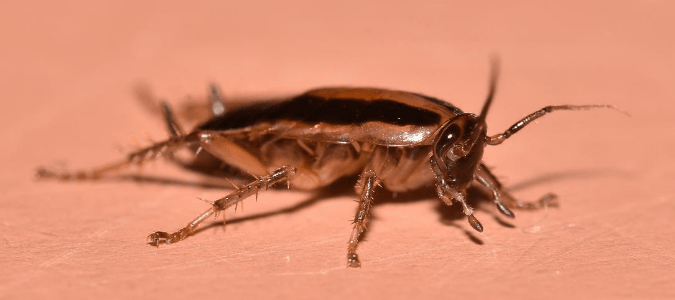Welcome to the ultimate guide to creating a bug-free garden using natural pest control solutions. If you’re tired of using harsh chemicals to control pests, you’ll be pleased to know that there are many plants that can help keep roaches away from your home.
Not only are these natural roach repellents effective, they’re also beautiful and easy to grow. In this article, we’ll show you which plants deter cockroaches, how they work, and how to use them in your garden.
Key Takeaways:
- Using natural roach repellents can be more effective and safer than harsh chemicals.
- Roach-resistant plants have specific characteristics and properties that deter cockroaches.
- Citronella, peppermint, lavender, rosemary, and catnip are effective natural roach repellents.
- Companion planting and strategic placement of plants can create a bug-free garden.
- Regular plant care and natural pest control solutions can help maintain a roach-free garden year-round.
Understanding Roach-Resistant Plants
When it comes to natural roach repellents, certain plants have properties that make them particularly effective at deterring these pests. These roach-resistant plants work by emitting scents that roaches find unpleasant, or by containing compounds that are toxic to them. By planting these types of plants in your garden, you can create a natural barrier against roaches and other pests.
Plants that deter cockroaches include herbs such as peppermint, rosemary, and lavender, as well as citronella and catnip. These plants are not only effective but also beautiful additions to any garden.
Understanding Roach-Resistant Plants
To fully understand the properties of roach-resistant plants, let’s take a closer look at their characteristics. Many of these plants have strong scents that roaches find repulsive, which is why they work so well as natural repellents. In addition, some plants contain compounds that are toxic to roaches, making them even more effective at pest control.
| Plant | Properties |
|---|---|
| Peppermint | Strong, minty scent that roaches find repulsive |
| Rosemary | Distinctive aroma that roaches find unpleasant |
| Lavender | Relaxing scent that repels roaches |
| Citronella | Lemon-scented natural insect repellent |
| Catnip | Contains nepetalactone, a natural insect repellent |
By understanding the properties of these roach-resistant plants, you can make informed decisions about which ones to include in your garden.
Citronella: A Powerful Natural Roach Repellent
If you’re looking for a natural roach repellent, citronella is a great place to start. This plant is well-known for its ability to keep pests away, and roaches are no exception. Citronella contains a natural oil that acts as a powerful insect repellent, making it an ideal addition to your pest control plants.


Citronella plants are best grown in full sun and require well-draining soil. They are low maintenance and easy to care for, making them a popular choice for those looking for natural pest control solutions. To use citronella as a roach repellent, simply crush a few leaves and place them in areas where roaches are commonly found.
Another option is to use citronella essential oil, which can be mixed with water and sprayed around your home and garden. Not only will this help repel roaches, but it will also give your space a pleasant, citrusy scent.
It’s important to note that while citronella is effective against roaches, it may not work as well against other pests. For maximum pest control, consider combining citronella with other natural roach repellents and pest control plants.
Peppermint: An Aromatic Solution to Roach Problems
Another herb that can help keep roaches away from your garden is peppermint. Its strong scent is known to repel various insects, including roaches. In fact, studies have shown that peppermint oil is effective in repelling German cockroaches – one of the most common types of roaches found in homes.
To utilize peppermint as a natural roach repellent, consider planting it in your garden. You can also make a peppermint spray by steeping peppermint leaves in hot water and adding a few drops of dish soap. This spray can be applied directly to areas where roaches are present, such as around the perimeter of your home or near garbage cans.
Peppermint is a versatile plant that can be grown in various conditions, including both indoors and outdoors. However, it is important to note that peppermint can be invasive and take over your garden if not properly contained. Consider planting it in a container to keep it under control.


Aside from being an effective cockroach repellent, peppermint also offers various health benefits. It is known to aid digestion, relieve headaches, and reduce stress. Additionally, its fresh scent can add a pleasant aroma to your garden.
Lavender: Beautiful and Effective Against Roaches
Lavender is a fragrant plant known for its soothing aroma and beautiful purple flowers, but did you know it can also help repel roaches? This plant is a natural roach repellent and can be a great addition to any pest control garden.
The strong scent of lavender is what makes it effective against roaches. The aroma is pleasant to humans but repels pests like cockroaches. Planting lavender in your garden can help keep roaches away without the use of harsh chemicals. Plus, the beautiful flowers will add beauty and color to your space.
To grow lavender, make sure it is planted in well-draining soil and receives plenty of sunlight. Water it regularly but avoid overwatering. You can also add compost to the soil to improve its quality.
To use lavender as a roach repellent, consider placing dried lavender sachets in areas where roaches are likely to hide, such as in cabinets or closets. You can also use lavender essential oil to create a homemade roach spray. Simply mix a few drops of lavender oil with water in a spray bottle and apply to areas where roaches are present.
Lavender is a great natural pest control solution that can keep your garden and home bug-free. Consider adding this beautiful and effective plant to your pest control arsenal.


Rosemary: A Versatile Herb for Roach Prevention
Rosemary is a classic herb that can serve multiple purposes in your garden, including acting as a natural repellent for roaches.
This herb has a unique scent that is pleasant to humans but off-putting to pests like roaches. The strong aroma of rosemary essential oil is often used in natural pest control solutions.
To use rosemary as a cockroach repellent, plant it in your garden or grow it in a pot on your porch. You can also use the leaves to make a natural insecticide spray. Simply steep the leaves in boiling water, strain the mixture, and pour it into a spray bottle.
Rosemary is easy to grow and requires little maintenance. It prefers a well-drained soil and full sun. It’s a great addition to any herb garden and can also be used in cooking.


If you’re looking for a versatile herb that can add flavor to your meals while also keeping roaches at bay, rosemary is a great choice. Its natural roach repellent properties make it a valuable addition to any garden.
Catnip: A Natural Enemy of Roaches
If you’re looking for a potent natural roach repellent, look no further than catnip. This member of the mint family is known for its powerful effect on roaches, thanks to a compound called nepetalactone. This substance is harmless to humans and pets, but it can send roaches running for the hills.
Catnip is relatively easy to grow and care for, making it a great choice for those new to gardening. You can start by planting catnip in pots or directly in your garden bed. Keep in mind that catnip is a fast-growing plant that can quickly take over a space, so be sure to plant it where you want it to stay.
One of the best ways to use catnip as a roach repellent is to crush the leaves and sprinkle them in areas where you see roaches, such as under sinks, around pipes, and near trash cans. You can also make a catnip tea solution by steeping the leaves in water and spraying it around your home.


Catnip is just one of many natural roach repellents you can use in your garden to keep pests at bay. By incorporating these plants into your landscaping, you can create a beautiful, bug-free space that you can enjoy all season long.
Other Roach-Repellent Plants to Consider
If you’re looking for more plants to complement your bug-repelling garden, consider adding bay leaves, chrysanthemums, and marigolds. Bay leaves are known for their pungent smell that repels roaches, making them a perfect addition to your pest control plants. Chrysanthemums contain a natural insecticide called pyrethrum, which is highly effective against roaches and other pests. Marigolds also contain pyrethrum and can help deter roaches, as well as other common garden pests like aphids and beetles.
Keep in mind that these plants are not as effective as the ones mentioned earlier, but they do provide additional protection against roaches and other pests. You can use them to create a diverse and beautiful garden while also keeping it bug-free.
When planting these plants, make sure to follow the same guidelines as with the other roach-repellent plants. Plant them strategically around your garden to maximize their effectiveness. You can also use them in conjunction with other plant-based cockroach deterrents to create a more comprehensive pest control strategy.


Creating a Bug-Free Garden with Roach-Repellent Plants
Now that you know which plants are effective in repelling roaches, it’s time to use them strategically to keep your garden bug-free. Companion planting is a great way to start. Consider planting roach-repellent plants near crops that are susceptible to pest infestations. This will help prevent roaches from attacking these crops while also adding a layer of protection to your garden.
In addition to companion planting, you should also strategically place plants throughout your garden. Place roach-repellent plants near entry points to your home, outdoor eating areas, and any other places where you spend a lot of time outside. This will help keep roaches away from these areas and prevent them from coming inside.
Regular maintenance of your garden is also important for roach control. Keep plants healthy by watering them regularly and removing any dead leaves or branches. This will not only keep your garden looking beautiful, but it will also prevent roaches from being attracted to decaying plant matter.
Using natural pest control solutions in addition to roach-repellent plants is also recommended. For example, diatomaceous earth is an effective, non-toxic substance that can be sprinkled around your garden to repel roaches and other pests. It works by dehydrating the insects and causing them to die.
Finally, be patient. It may take some time for roaches to become deterred by your garden. But with consistent use of roach-repellent plants and other natural pest control solutions, you can create a bug-free garden that is both beautiful and functional.


Maintaining a Roach-Free Garden Year-Round
Keeping your garden free from roaches requires some effort, but it’s worth it for a pest-free outdoor space. By relying on natural roach repellents and using plants to repel pests, you can create a garden that is healthy and free from bugs. Here are some tips to help you maintain a roach-free garden year-round:
Regular Plant Care
One of the best ways to keep roaches out of your garden is to keep your plants healthy. Make sure to regularly water and fertilize your plants, and remove any dead or dying foliage. Roaches are attracted to decaying plant matter, so keeping your garden clean and tidy is essential.
Pest Prevention Strategies
In addition to using roach-repellent plants, there are other natural pest control solutions that can help keep roaches away from your garden. For example, you can encourage beneficial insects like ladybugs and praying mantises to take up residence in your garden. These insects will eat other pests, like aphids and spider mites, which can attract roaches.
You can also make your garden less hospitable to roaches by removing hiding places. Piles of brush or leaves, for example, can provide a haven for roaches. Make sure to keep your garden clear of debris and clutter.
Companion Planting
Companion planting is a strategy where you grow two or more plants together that benefit each other in some way. Some plants, for example, can repel pests or attract beneficial insects. By incorporating companion planting into your garden, you can naturally repel roaches and other pests.
For example, marigolds are known to repel roaches and other insects. Planting marigolds alongside your other garden plants can help keep roaches away.
Using Plant-Based Cockroach Deterrents
In addition to using roach-repellent plants, there are other natural pest control solutions that can help keep roaches away from your garden. For example, you can use essential oils like peppermint or lavender to deter roaches. Simply mix a few drops of the oil with water and spray it around your garden.
You can also create your own roach bait by mixing borax with sugar or honey. Place the bait in areas where roaches are likely to congregate, such as near your compost bin or in dark corners of your garden.


By following these tips, you can create a garden that is healthy and free from roaches. Remember to regularly maintain your plants, use natural pest control solutions, and take advantage of companion planting to keep your garden pest-free year-round.
Conclusion:
Congratulations! You now have the knowledge and tools to create your own bug-free garden using natural pest control solutions. By incorporating roach-repellent plants such as citronella, peppermint, lavender, rosemary, and catnip, you can effectively deter roaches and other pests from invading your garden.
Remember to consider other roach-repellent plants such as bay leaves, chrysanthemums, and marigolds to complement your garden. Utilize companion planting and strategic placement to maximize the effectiveness of these natural pest control solutions.
By maintaining your garden regularly and using additional pest prevention strategies, you can enjoy a beautiful and roach-free garden year-round. Say goodbye to harmful chemicals and hello to a natural, eco-friendly approach to pest control!
FAQ
Q: What plants keep roaches away?
A: There are several plants that can help repel roaches, including citronella, peppermint, lavender, rosemary, and catnip. These plants have distinct scents that roaches find unpleasant, making them effective natural roach repellents.
Q: Are these plants also effective against other pests?
A: Yes, many of these roach-repellent plants also deter other pests like mosquitoes, flies, and ants. They can provide a natural solution for overall pest control in your garden.
Q: How do roach-repellent plants work?
A: Roach-repellent plants emit certain odors that cockroaches find repulsive. These odors can interfere with the roaches’ ability to locate food and communicate with each other, making them less likely to infest your garden.
Q: How do I grow and maintain these plants?
A: Each plant has specific growing requirements, but in general, they prefer well-drained soil and ample sunlight. Regular watering and occasional pruning may be necessary to keep them healthy. Consult specific plant care guides for detailed instructions.
Q: Can I use these plants indoors to repel roaches?
A: Yes, many roach-repellent plants can also be grown indoors in pots or containers. Placing them near windows, doors, or other roach entry points can help deter the pests from entering your home.
Q: Are these plants safe for pets?
A: Most of these plants are safe for pets when used as directed. However, it’s always a good idea to research specific plant toxicity and consult with a veterinarian if you have concerns about your pet’s safety.
Q: How long do these plants remain effective in repelling roaches?
A: The effectiveness of roach-repellent plants can vary depending on factors such as plant health, environmental conditions, and the severity of the roach infestation. Regular maintenance and monitoring are recommended to ensure continued effectiveness.
Q: Can I use roach-repellent plants as the sole method of pest control?
A: While roach-repellent plants can be effective in deterring roaches, they may not completely eliminate an existing infestation. It’s best to use them as part of an integrated pest management approach, which may include other control methods such as sanitation, trapping, and professional pest control services.
Q: Will these plants attract other pests?
A: It’s possible that certain plants could attract other pests, especially if they produce flowers or fruits. However, the benefits of repelling roaches and other unwanted pests often outweigh the minor risk of attracting other insects.
Q: Can I use plant extracts or essential oils instead of growing the actual plants?
A: Yes, plant extracts or essential oils from roach-repellent plants can be used as a natural roach deterrent. Dilute the extracts or oils in water and spray the mixture in areas where roaches are commonly found.
Your Expert in Animal Control and Extermination. Trust our experience for humane, effective pest management, protecting your property and ensuring peace of mind with Michael S.





